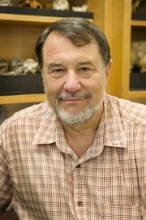

The existence of early humans in the islands of Southeast Asia, confirmed by fossils of species that predate Homo sapiens, has long provided a mystery to anthropologists.
How did the species survive? What were conditions on the islands like for these early species? When did the species—Homo erectus, Homo floresiensis, and others—become extinct?
Russell Ciochon, University of Iowa professor of anthropology and director of the UI's Museum Studies program, has published a groundbreaking article in Evolutionary Anthropology—co-authored by Paleolithic archeologist and environmental educator Roy Larick—that answers those fundamental questions.
The article, titled "Early hominin biogeography in Island Southeast Asia," is the first to calibrate the known activities of these early species with the pulse of global sea-level shifts, natural disasters, and other factors across three climate periods of the Pleistocene, the epoch that ended with the last Ice Age. The article concludes that "Early hominins apparently responded to changing island conditions for a million-and-a-half years, likely becoming extinct during the period in which Homo sapiens colonized the region."
The article appears in the September/October 2015 print version of Evolutionary Anthropology (Volume 24, Issue 5; pages 185-213), and is available online. The image above is a key illustration from the paper.